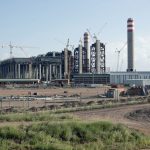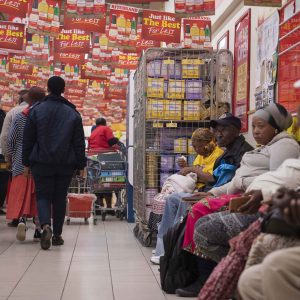Joburg township residents powerless in lockdown
The residents of Phola Park are struggling with intermittent electricity supply as the presence of soldiers in the area causes old apartheid traumas to resurface.
Author:
4 May 2020

“There are many things that are troubling people. When there is a protest, people vent all these frustrations and make demands. The problem is that the government does not come to people. “Uhulumeni akasondeli ebantwini. Usondela manje ngalendaba ye-corona [Government does not come close to people. They are only coming now because of coronavirus],” said 63-year-old community activist Masechaba Ngobese*.
In the first week of the government’s national Covid-19 lockdown, after experiencing numerous abrupt power cuts, the residents of Phola Park Extension 1 and 5 in Katlehong, east of Johannesburg, took to the streets to demand access to electricity.
The government and state-owned electricity supplier Eskom committed to providing uninterrupted electricity for the duration of the lockdown. So the power cuts came as a shock, said community activist Noma-Russia Bonase, 53.
“The first time, the whole of Thokoza did not have electricity,” said Bonase. And this was “not load shedding because it was announced that there won’t be load shedding. There was no electricity. We phoned the [Ekurhuleni] municipality and there were no answers as to why we don’t have power.”
Related article:
She said the lack of response from the municipality and local councillors forced people to organise a protest to demand electricity. “Police came and shot people with rubber bullets. Some ran to their houses and police followed them to their houses,” said Bonase.
On 3 April, the electricity in Phola Park came back on for an hour. “That angered the residents. Called local councillors and municipalities but there was no response … and people picketed again demanding electricity and police came back and chaos ensued. It continued without anyone explaining as to what happened. Local councillors unreachable and the municipality as well,” said Bonase. The protest continued and the police “ended up speaking to us, because the community was not stopping”.
Bonase asked rhetorically, “Why do we always have to picket for them to listen and return electricity? They don’t explain what is the cause of the power outage. It is confusing. On one hand, they say there is a lockdown, but they are not delivering services, forcing us to march.” This exposes the residents to Covid-19, she added.
After almost a week without electricity, supply was restored on 6 April. “But we don’t trust that it will stay on,” said Bonase.
Irreparable damage
Food that people had bought for the lockdown went off and had to be thrown away. “Meat has been disposed of because of the lack of electricity for almost two weeks. Everyone had tried to stock food with the little money that they have, because we had been instructed to stay at home. Most people here are unemployed and we have a lot of child-headed households.”
Related article:
Electric appliances were also damaged – stoves, televisions and fridges – because of the abrupt electricity cuts. People have been asking themselves if the government will compensate them, said Bonase.
Ngobese echoed this sentiment, saying that “as we speak, my television is not working. The problem is that they don’t tell us when they plan a power outage, so as to unplug essential electric appliances. To fix my TV will cost R900. Imagine, the person who fixes them is self-isolating like the rest of us, so he can’t fix it for me. My television got damaged because of the unreliable electricity.”
Though the power came back on after residents protested, it went off again over the Easter weekend, said Bonase. “The thing is, the electricity supply in our area is not reliable. As to what might be the cause I cannot tell you.”
She said electricity was a big problem even before the lockdown. If load shedding was scheduled for certain hours, they’d be without electricity for days in the area.
The lack of electricity has huge implications for residents, said Bonase. At a time when access to information is critical, they are left behind because they don’t have power.
As a community leader and organiser, Bonase approached the Gauteng government seeking information about Covid-19. But she did not receive help.
“We are being told that we must stay inside our houses, but there is no workshop on how this works,” she said. “We did ask for help from the premier’s office and Gauteng premier seeking help and information around the disease, to assist members of my community. I phoned myself. I was referred to the health minister in the province. I need information and need to help those that are vulnerable. He said, ‘How would you help them, when you have been told to stay in your houses and wash your hands with soap? What else do you want? Because even you, you are supposed to be indoors.’”
Retraumatised by the presence of soldiers
President Cyril Ramaphosa has indicated that the government will deploy 73 180 members of the South African National Defence Force, in addition to the 2 280 army members already deployed, to assist the South African Police Service in enforcing its Covid-19 regulations.
But people don’t like being chased by the police. They feel dehumanised, said Bonase.
Already, military ombudsmen have confirmed that they are investigating more than 33 cases of human rights violations by soldiers across the country during the initial lockdown.
Related article:
“The problem that we have is that these soldiers and police that are being sent here are traumatising people, because they evoke in people traumatic experiences and memories of apartheid brutality,” said Bonase.
The townships on the East Rand – Katlehong, Thokoza – are among many that experienced severe state violence during apartheid. “This lockdown comes at a time when we are still fighting for justice for victims of apartheid who, to date, have not received reparations,” said Bonase, who is also a leader of the apartheid victims organisation Khulumani Support Group.
The 1993 Goldstone Commission of Inquiry into public violence, referenced during the Truth and Reconciliation Commission, found the conduct of the SADF 32 Battalion to be “completely inconsistent with the function of a peacekeeping force”. The commission recommended that the battalion be banned from operating. These soldiers invaded the Phola Park shack settlement, without police presence, and killed, tortured and raped residents.
“Peacekeeping soldiers were sent in our area … We have stories of people whose wives were raped by the army and men who were injured by soldiers when they cordoned off the area. So the return of soldiers in our area is really traumatising,” said Bonase.
*Masechaba Ngobese is not her real name



